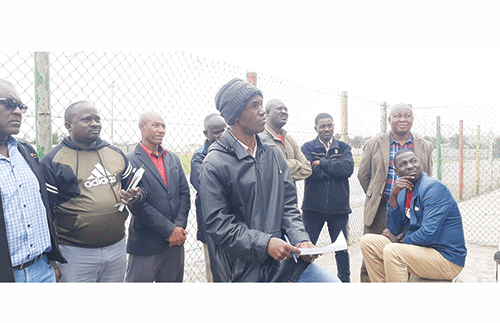WALVIS BAY – Fisheries minister Derek Klazen and labour minister Utoni Nujoma say they will have to consult Cabinet on the re-employment of fishermen.
They said the Governmental Employment Redressing Programme (GERP) to re-employ the fishermen is experiencing challenges from companies and the fishermen themselves.
A Cabinet decision in 2020 directed the two ministries to secure full-time employment for former Namsov employees, and those who lost their jobs during the 2015 illegal strike.
Klazen and Uutoni on Friday told the media they met with over 600 workers under the programme, union representatives and eight companies to understand the challenges.
“We were sitting in these long meetings for almost 10 hours, listening to their complaints.
Of course, the government was genuine, and wanted to provide these workers with work so that they could continue providing for their families,” Nujoma said.
He observed that the fishermen’s complaints are genuine, but the companies also had their persistent challenges and complaints.
Workers are not satisfied with the current working conditions due to salaries and safety gear, and they think the salaries are not adequate.
“They would like to go to sea and earn more than the N$4 000 they are currently getting. However, the employers are struggling to accommodate all these workers. So, this is the challenge we are currently facing”, Nujoma stated.
Back to drawing board
Klazen said at the same briefing that they concluded to go back to the drawing board.
“We need to go and sit to see how we can try to better the situation that is currently ongoing. It is the first time that we are doing such an exercise, and it is coming with trials and turbulences. The Swapo government is a caring government and wanted to assist the fishermen,” he noted.
He added that the government should not be held hostage by the fishermen for this exercise, as it is meant to be a once-off initiative.
Klazen said two years ago, they initiated an exercise where they asked Namibian companies to provide expressions of interest to see if they could employ these fishermen.
They received interest from 18 companies, and their applications were reviewed. Seven reputable companies were then selected to employ the fishermen.
Although some of the companies were ready to charter vessels, they realised the quota allocated by the ministry would not be sufficient for that.
Some companies also had to release already-chartered vessels due to lengthy processes.
“During Friday’s meetings, we realised that the ministry’s quota was not sufficient for companies to charter or buy their boats. The limited quota only allows companies to pay a certain salary. As a result, many workers are at home, receiving a lower salary than they would if they were on a boat,” Klazen said.
They will now have to review their findings from this meeting, sit down with the companies again, and negotiate.
“We cannot continue with the current situation. We also urged the companies not to victimise these workers when they voice their concerns. Furthermore, the current agreements will remain in place, and monitoring and evaluation of these companies will be undertaken”, he continued.
No more quotas
The ministers agreed more quotas cannot be given, as the total allowable catch is simply not enough.
“Our TAC (total allowable catch) is diminishing. The TAC is not enough. Therefore, more quotas cannot just be given. Hence, the status quo will remain until we find a better solution.”
-edeklerk@nepc.com.na


